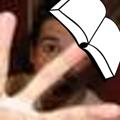It's probably a bit unfair to judge a story from Dune's era by the standards of modern science fiction, so take it as understood that when I complain about, for example, cliches and overused tropes, I recognize that the genre was newer back then, and what's cliche today may have been fresh when the book was written. I also grant that much of what appears in Dune has become iconic. Seemingly every desert planet in sci fi, not to mention the occasional planet with appreciable precipitation, has giant burrowing worms infesting it, to take just one example. Having said that, though, I didn't read the book in 1965, I read it in 2009, so I'm less interested in what I might have thought had I read it forty years ago than I am in what I did think reading it today.
Dune certainly deserves an important spot in the history of the genre, but the copy of the novel I read proclaims itself, via a cover blurb, "Science fiction's supreme masterpiece", which is going a bit far. I expect more than "eh, it got a number of things right, largely by doing them first, and the things it got wrong it got wrong in ways that used to be less tiresome" from a "supreme masterpiece". It's probably worth mentioning here that I'd expect "Science fiction's supreme masterpiece" to be more firmly entrenched in the realm of science fiction. Dune is far enough to the "soft" side of the science fiction continuum that, like many other works (Star Wars, for example) it can be more fairly characterized as a fantasy where the superpowers are attributed to technology instead of magic.
The story is a scrapyard of tired, played out science fiction and fantasy tropes. In short, it's the tale of a deposed royal heir who flees to the wilderness, goes native with the noble savages living therein, learning their survival skills while imparting to them his civilized leadership, and eventually claims his throne, thus fulfilling a prophecy and achieving his special destiny. This all takes place against the background of one of my least favorite lazy stock settings, Feudalism in Space. The protagonist's noble house is uniformly upstanding and heroic, while the antagonist house that ousts them is uniformly evil and treacherous. The ultimate driving factor behind the plot is humanity's "racial memory" which somehow "knows" that the human race is stagnant and "wants" to further its evolution. Ugh.
The characters are poorly developed caricatures, particularly the protagonist. Paul-Maud'Dib is less a character than he is a collection of powers and abilities. He has no real weaknesses or character flaws. He's an insurmountable fighter, universally acknowledged as able to defeat any member of the Fremen, who are in turn universally acknowledged to be better than the Emperor's crack Sardaukar, who are universally acknowledged to be better than anyone else. He's also a wise leader, respected by the Fremen, and able to outwit his chief rivals, the Emperor, and the Bene Gesserit. From the age of fifteen, he is already taking charge of his mother, who is not only an adult but a trained Bene Gesserit, with all the mental and physical discipline inherent in that, and defeating Fremen in single combat. He has every superpower that canonically exists, having been not only trained as a Bene Gesserit, but also as a Mentat, not to mention combat training from the very best professional soliders. To top it all off, he is the prophesied Kwizatz Haderach, making him the only man with the genetic memory superpower normally restricted to Bene Gesserit Reverend Mothers. By the age of, I believe, 19 he has displaced the Emperor and sits on the throne. I got a 77 out of a possible 100 by filling in an online Mary Sue test using Paul as a template, and this without knowing whether he and Frank Herbert share any interests (unlikely...I suspect Paul doesn't have any interests beyond reclaiming thrones and developing new powers).
Among all the other worn out tropes, I found myself scoffing at the Fremen's role as transparent stand-ins for a Lawrence of Arabia style view of Arab Muslims, noble savages awaiting the civilized leadership whose lack is all that prevents them from rising up and ousting one colonial power in favor of another, ostensibly more enlightened, colonial power. The scoffing rose to the level of actual offense, however, when I reached the scene in which the Fremen Reverend Mother refers to "our Sunni ancestors", and realization set in that the Fremen are not merely the clumsy equivalent of Space Muslims, they are literally Space Muslims, in the Space Desert, controlling access to the Critical Space Resource. Further, these Space Muslims aren't even allowed to be Muslims. Rather than anything which might be recognizable as Space Islam, their religion has two identifiable aspects. First, a dream of ecological salvation given to them by a colonial scientist whom they, naturally, accept into their society and revere as a leader. Second, and more offensively, a prophecy artificially grafted onto their culture by the Bene Gesserit that, like something out of the wettest of T.E. Lawrence's wet dreams, predisposes them to give aid and comfort to a colonial who will someday appear to lead them. Again, I realize that 1965 was a different time, hell, Orientalism hadn't even been written yet, but the implications of the treatment of the Fremen in the story are unpleasant to say the least.
Overall, I'd give it two giant worms out of a possible five. The plot, while hackneyed, was almost entertaining enough to carry the cardboard characters and it has a number of interesting concepts which are, unfortunately dragged down by the unfortunate implication that colonialism is great, as long as you're from the right colonial power.








